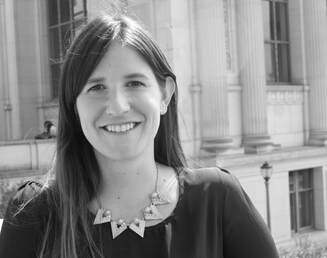Guadalupe TuñónI am an Assistant Professor in Princeton's Department of Politics and School of Public and International Affairs. I study comparative politics and political economy with a regional focus on Latin America. My first book project investigates how religious ideas about economics and inequality shape the electoral and policy influence of religious actors.
I received my PhD in Political Science from UC Berkeley in 2019. Before coming to Princeton, I was an Academy Scholar at Harvard's Weatherhead Center for International Affairs as well as a predoctoral fellow at the Identity & Conflict Lab (University of Pennsylvania) and the Center for the Study of Religion and Society (University of Notre Dame). You can reach me at: tunon[at]princeton.edu CV |
Peer-Reviewed Articles
"Disrupting Compliance: The Impact of a Randomized Tax Holiday in Uruguay" Conditionally accepted at The Journal of Politics (with Thad Dunning, Felipe Monestier, Rafael Piñeiro and Fernando Rosenblatt)
Witch Hunts? Electoral Cycles and Corruption Lawsuits in Argentina (2023) British Journal of Political Science (with German Feierherd and Ezequiel Gonzalez-Ocantos)
Placebo Tests for Causal Inference (2023) American Journal of Political Science (with Andy Eggers and Allan Dafoe).
Does the Monetary Cost of Abstaining Increase Turnout? Causal Evidence from Peru (2022) Electoral Studies, 75 (with German Feierherd and Gerson Julcarima-Alvarez).
[Report for the Peruvian Electoral Commission]
Who Wants an Independent Court? Political Competition and Supreme Court Autonomy in the Argentine Provinces, 1984-2008 (2015) The Journal of Politics, 77 (1) (with Marcelo Leiras and Agustina Giraudy).
[Replication]
Witch Hunts? Electoral Cycles and Corruption Lawsuits in Argentina (2023) British Journal of Political Science (with German Feierherd and Ezequiel Gonzalez-Ocantos)
Placebo Tests for Causal Inference (2023) American Journal of Political Science (with Andy Eggers and Allan Dafoe).
Does the Monetary Cost of Abstaining Increase Turnout? Causal Evidence from Peru (2022) Electoral Studies, 75 (with German Feierherd and Gerson Julcarima-Alvarez).
[Report for the Peruvian Electoral Commission]
Who Wants an Independent Court? Political Competition and Supreme Court Autonomy in the Argentine Provinces, 1984-2008 (2015) The Journal of Politics, 77 (1) (with Marcelo Leiras and Agustina Giraudy).
[Replication]
UNDER REVIEW AND REVISION REQUESTED
"Oppression Beyond Plantations: The Effect of Emancipation on Incarceration in Urban Buenos Aires" (with Valentin Figueroa) [Revise and resubmit]
"Movin’ on Up? The Impacts of a Large-Scale Housing Lottery in Uruguay" (with Vincent Armentano, Craig McIntosh, Felipe Monestier, Rafael Piñeiro and Fernando Rosenblatt) [Revise and resubmit]
"When the Church Votes Left: How Progressive Bishops Supported the Workers' Party in Brazil" [Revise and resubmit]
Winner of the Mancur Olson Prize for the best dissertation in political economy, APSA 2020
Winner of the Aaron Wildavsky Award for the best dissertation on religion and politics, APSA 2020
"Special Interest Trade-Offs: Campaign Finance Reforms and Religious Influence in Politics in Brazil" (with Melani Cammett and Lucas Novaes) [Revise and resubmit]
"Movin’ on Up? The Impacts of a Large-Scale Housing Lottery in Uruguay" (with Vincent Armentano, Craig McIntosh, Felipe Monestier, Rafael Piñeiro and Fernando Rosenblatt) [Revise and resubmit]
"When the Church Votes Left: How Progressive Bishops Supported the Workers' Party in Brazil" [Revise and resubmit]
Winner of the Mancur Olson Prize for the best dissertation in political economy, APSA 2020
Winner of the Aaron Wildavsky Award for the best dissertation on religion and politics, APSA 2020
"Special Interest Trade-Offs: Campaign Finance Reforms and Religious Influence in Politics in Brazil" (with Melani Cammett and Lucas Novaes) [Revise and resubmit]
WORKING PAPERS
"Why do Authoritarian Successor Parties Succeed?: How Francoist Legacies in the Spanish Catholic Church Boosted Regime Successor Party Performance", with Miguel Alquezar-Yus and Viivi Jarvi
"Why do Authoritarian Successor Parties Succeed?: How Francoist Legacies in the Spanish Catholic Church Boosted Regime Successor Party Performance", with Miguel Alquezar-Yus and Viivi Jarvi
Other Publications
"Graphical Presentation of Regression Discontinuity Results" (2015) The Political Methodologist, blog and print newsletter (with Natália S. Bueno).
"Religious Regulation in Brazil" (2019) Oxford Research Encyclopedia of Politics & Religion (with Claudia Cerqueira).
"Causal Inference and Knowledge Accumulation in Historical Political Economy" (2022) The Oxford Handbook of Historical Political Economy (with Anna Callis and Thad Dunning).
"Knowledge Accumulation Through Natural Experiments" (Forthcoming) The Oxford Handbook of Methodological Pluralism in Political Science (with Anna Callis and Thad Dunning).
"Religious Regulation in Brazil" (2019) Oxford Research Encyclopedia of Politics & Religion (with Claudia Cerqueira).
"Causal Inference and Knowledge Accumulation in Historical Political Economy" (2022) The Oxford Handbook of Historical Political Economy (with Anna Callis and Thad Dunning).
"Knowledge Accumulation Through Natural Experiments" (Forthcoming) The Oxford Handbook of Methodological Pluralism in Political Science (with Anna Callis and Thad Dunning).
